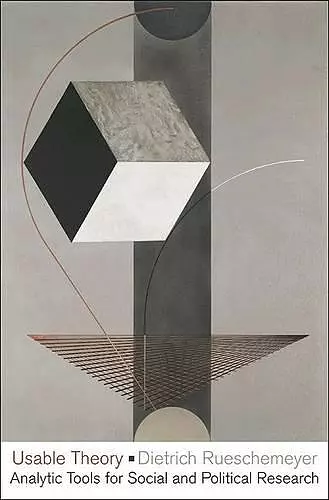Usable Theory
Analytic Tools for Social and Political Research
Format:Paperback
Publisher:Princeton University Press
Published:11th Sep '09
Currently unavailable, and unfortunately no date known when it will be back

Usable Theory is a boon to everyone in search of tools to understand the social world. Those tempted to see theory simply as a means of demonstrating erudition and those tempted to substitute rigorous measurement for engagement with theory should both read Rueschemeyer's new book. With unpretentious but sophisticated clarity, he shows how theory can be a powerful, practical means for getting leverage on a full array of substantive problems. -- Peter B. Evans, University of California, Berkeley Dietrich Rueschemeyer walks the same path as sociology's founders, particularly Max Weber, and all those in contemporary theory who have sought to resolve the micro-macro gap. He has succeeded where many others have failed. This is a masterful work. -- Jonathan H. Turner, University of California, Riverside Usable Theory may be the best book on social theory since Weber's Economy and Society. If Rueschemeyer is right that integrated sets of confirmed and general propositions about the social world will one day be possible (and I think he is), this book will contribute greatly to that achievement. In the meantime, it will prove immensely stimulating to new researchers and veteran academics alike in their quest to achieve firmer local knowledge. Essential reading. -- James Mahoney, Northwestern University This book is a winner, and I believe it will become a standard reference in social theory. -- Gary Goertz, University of Arizona
Shows graduate students and researchers how to construct theory frames and use them to develop valid empirical hypotheses in the course of empirical social and political research. This title seeks to mobilize the implicit theoretical social knowledge used in everyday life. It also relates theoretical ideas to problems of methodology.The project of twentieth-century sociology and political science--to create predictive scientific theory--resulted in few full-scale theories that can be taken off the shelf and successfully applied to empirical puzzles. Yet focused "theory frames" that formulate problems and point to relevant causal factors and conditions have produced vibrant, insightful, and analytically oriented empirical research. While theory frames alone cannot offer explanation or prediction, they guide empirical theory formation and give direction to inferences from empirical evidence. They are also responsible for much of the progress in the social sciences. In Usable Theory, distinguished sociologist Dietrich Rueschemeyer shows graduate students and researchers how to construct theory frames and use them to develop valid empirical hypotheses in the course of empirical social and political research. Combining new ideas as well as analytic tools derived from classic and recent theoretical traditions, the book enlarges the rationalist model of action by focusing on knowledge, norms, preferences, and emotions, and it discusses larger social formations that shape elementary forms of action. Throughout, Usable Theory seeks to mobilize the implicit theoretical social knowledge used in everyday life. * Offers tools for theory building in social and political research * Complements the rationalist model of action with discussions of knowledge, norms, preferences, and emotions * Relates theoretical ideas to problems of methodology * Situates elementary forms of action in relation to larger formations * Combines new ideas with themes from classic and more recent theories
"Rueschemeyer's book is promising as the foundation to produce a literature review and the subsequent drawing of hypotheses... This is valuable to the researcher approaching the field of study for the first time and looking for a basic framework."--Richard Arnold, Teaching Sociology "Drawing on his experience teaching classical and modern theory over several decades, Dietrich Rueschemeyer has written a very practical book that aims to provide a catalogue of usable theory... Although the book is meant to aid undergraduate and graduate students in formulating their research projects, it also might be of interest to seasoned sociologists who want to examine the degree to which their own inclusions and exclusions overlap with those found in this book."--G. William Domhoff, American Journal of Sociology "Usable Theory is nothing less than Amazonian in its detail and complexity... Usable Theory is therefore not very well suited to undergraduates, whom it is more likely to confound than enlighten, but it is nevertheless an important book that should be read by advanced students of politics and established social scientists alike."--Daniel Falkiner, Political Studies Review "The well-written, easy to follow arguments would make this book useful in postgraduate upper-level theory and/or methods courses... Usable Theory ... provide[s] a starting point for effective utilization of theory in social research. From this perspective, it deserves a spot on any researcher's shelf."--Jason L Weigle, Sociology
ISBN: 9780691129594
Dimensions: unknown
Weight: 482g
352 pages